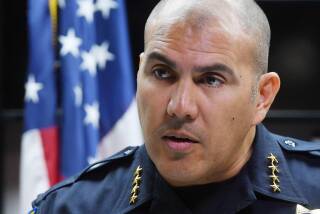Burgreen to Retire as Top S.D. Cop
- Share via
SAN DIEGO — Police Chief Bob Burgreen said Tuesday that he will retire in January, after nearly 33 years with the department, to take advantage of a new city retirement plan but will continue as chief until May under a separate 90-day contract with the city.
When he was appointed chief in September, 1988, Burgreen announced that he would keep the job only five years before he retired to Arkansas. He and his wife own land outside Hot Springs on which they plan to build a home.
In recent months, he has hedged on exactly when he would leave. But Tuesday, the 53-year-old Burgreen said he would take a proposed early buyout extended to about 300 city employees who are eligible to retire.
The City Council approved the plan Tuesday, which will add two years of service to anyone willing to take early retirement between Dec. 1 of this year and Jan. 4, 1993.
“If this is offered, how can I walk away from it?” Burgreen said. “It means a couple of thousand of bucks a year extra to me.”
City Manager Jack McGrory said he would like to extend Burgreen’s tenure as chief under several ways now under consideration, including an employment contract that would allow Burgreen to stay in charge of the 1,850-member department.
Burgreen speculated that he will stay until May. McGrory said he is considering a plan to keep Burgreen as chief until at least June or July but would not give specifics.
“He’s been an outstanding chief of police,” McGrory said. “I’d like to keep him as long as I can.”
Following the resignation of Bill Kolender in 1988 after 13 years as chief, then-City Manager John Lockwood selected Burgreen from among four in-house candidates and an outside police official.
At the time, Burgreen had been tainted with a written reprimand by Lockwood for using city video equipment to film fishing trips and for helping Kolender fix parking tickets. But the City Council enthusiastically endorsed Burgreen.
Providing a stark contrast to Kolender and his penchant for attending black-tie dinners and accepting numerous speaking engagements, Burgreen chose to spend his time improving the department’s image in the community and meeting with neighborhood leaders.
Whenever a crisis has erupted during his tenure as chief, Burgreen has acted quickly to keep it from spreading. In 1991, for example, when officers shot 28 people in the line of duty, killing 12 and injuring 16, Burgreen commissioned a study to stem the use of force and the shootings substantially decreased.
After seven suspects in three years died in custody when officers used a controversial restraint hold, Burgreen restricted its use. When a special narcotics unit was mired in scandal, the chief took the blame. When an officer was arrested for raping and robbing women along the beach last year, Burgreen immediately called a press conference and laid out the facts.
Burgreen joined the department on April. 15, 1960, and was promoted to sergeant in 1966. A year later, he became lieutenant, the youngest ever in the department at the time. By 1969, he was captain and by 1973 a commander. He became a deputy chief in 1976 and second in charge to Kolender in 1978.
Repeatedly, Burgreen makes the point that the average tenure of big-city police chiefs is 3 1/2 years and notes with pride that he has already exceeded that.
The San Diego Police Department underwent a major restructuring in the past year and reduced two levels of command by allowing many top administrators to retire. The department has 144 officers at all levels eligible for retirement, and Burgreen predicted that 50 to 70 would accept the early buyouts.
Word of Burgreen’s retirement is bound to spark speculation over who will succeed him, but the chief will not publicly discuss his recommendations. All seven of his assistant chiefs would be good candidates, he said.
“I would only hope that next chief keeps with the policies and procedures we have already put in place,” Burgreen said. “As much as possible, I want a seamless transition. There will be a new nameplate on the desk, but the operation should run as smoothly as possible.”
Executive Assistant Chief Norm Stamper is Burgreen’s second in command, but the head of the police union has told McGrory that the membership does not support Stamper as chief.
Shortly after The Times reported the union’s opposition, Burgreen appointed Stamper head of field operations, and Stamper has spent hours riding with officers on patrol calls, often in uniform.
More to Read
Sign up for Essential California
The most important California stories and recommendations in your inbox every morning.
You may occasionally receive promotional content from the Los Angeles Times.













